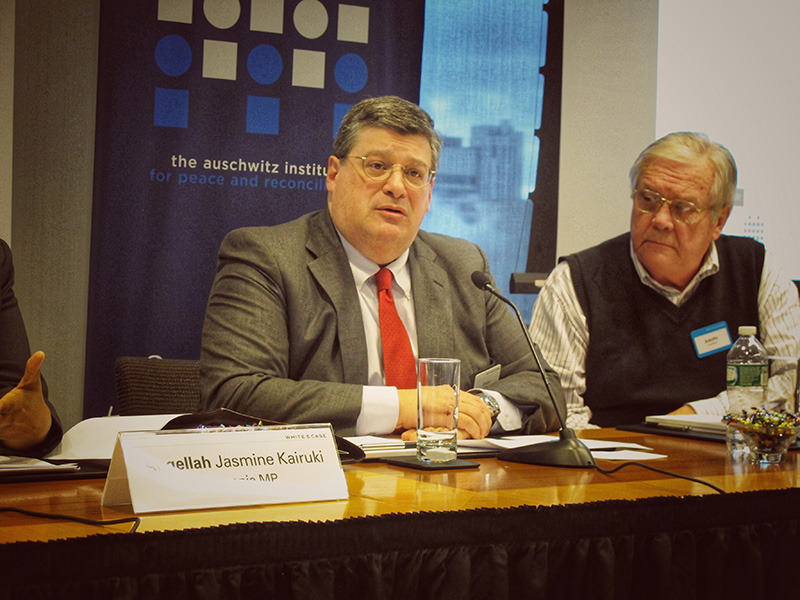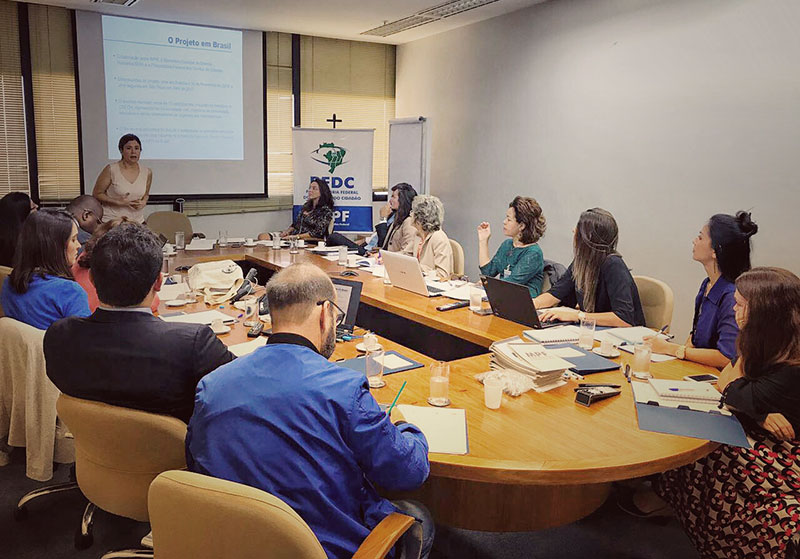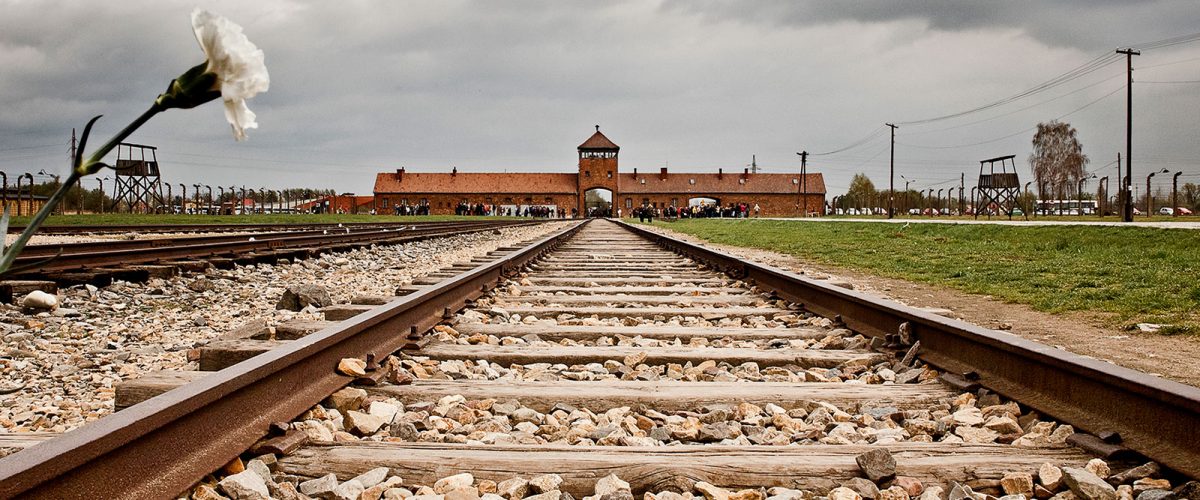Never againx
New York Partner Owen Pell gives an insight into his work on genocide prevention.
In the latest of a series of articles shining a spotlight on how we at White & Case are contributing as global citizens, we speak to New York Partner Owen Pell about the Auschwitz Institute for Peace and Reconciliation, which is helping nations around the world build the capacity to prevent future atrocities by learning lessons from the past.
It’s one of the darkest episodes in human history and, for New York Partner Owen Pell, helping ensure we learn the lessons of this horrific atrocity is a labor of love.
He explains: “When you’ve worked on numerous cases involving the Holocaust and Holocaust-looted art it can be emotionally exhausting and heart-breaking.
“I reached a point where I’d had enough of always looking back at the mistakes of the past, and decided to try and do something that might help us prevent this from ever happening again.”
Around 16 years ago, Owen met Fred Schwartz, a former businessman who spent the last 25 years of his life, until his death in 2016, working on genocide prevention. Through his work with Fred Schwartz, Owen got involved with the Auschwitz Institute for Peace and Reconciliation (AIPR).
“If you ask most people on the street how governments prevent genocide, they’d likely reply: ‘It’s when we send the troops in to stop the killing’. But that isn’t genocide prevention, that’s stopping a genocide that is already well underway.”
AIPR is a non-governmental organization and is now the largest NGO training government officials from around the world in genocide and mass atrocity prevention, which includes training them to identify and address the cultural, social, ethnic and other processes that over time have the potential to escalate into acts of genocide or mass atrocity violence, and then how to disrupt or reduce those processes.
Owen, who now heads AIPR’s Board of Directors, explains: “AIPR seeks to change how we think about genocide. If you ask most people on the street how governments prevent genocide, they’d likely reply: ‘It’s when we send the troops in to stop the killing’.
“But that isn’t genocide prevention, that’s stopping a genocide that is already well underway.”
AIPR takes the view that no genocide or mass atrocity outbreak is either random or spontaneous. Rather, they are the culmination of processes that can be percolating for decades or longer. Its aim is to train government officials to identify, monitor and work to interrupt or disrupt these processes so as to delay, reduce or eliminate outbreaks of violence. Thus, AIPR takes a long-term view and works quietly behind the scenes to promote incremental change.
“What we do is create an environment for progress,” says Owen. “For instance, if police violence is a problem, we can help one or more nations to mobilize and introduce training programs, as well as give them advice on measuring the success of those programs.”
The institute gets its name from the Auschwitz-Birkenau concentration camp in Poland, where more than 1.5 million Jews lost their lives between 1940 and 1945, along with thousands of Sinti, Roma, Poles and Russian prisoners of war.
“Over the past 10 years we’ve trained more than 4,000 government officials from more than 80 countries in genocide and mass atrocity prevention.”
AIPR chose the camp as the venue for its introductory training sessions because Auschwitz-Birkenau is an important site of memory that ensures that participants are left in no doubt of the shattering reality and legacy of genocide. Follow-on training is then held at sites of memory in countries that participate in AIPR’s programs.
“Our classroom is 100 yards from the gas chamber,” explains Owen. “Over the past 10 years we’ve trained more than 4,000 government officials from more than 80 countries in genocide and mass atrocity prevention.
“Thus far, our most active networks for training involve officials from Latin America and East Africa, as well as a new program in south eastern Europe, perhaps because these regions have experienced genocide or mass atrocity violence over the last 25 years.”
One of AIPR’s principal aims is to encourage governments to establish some form of ‘national mechanism’, which could be a government unit, office or ombudsperson dedicated to the identification and prevention of genocide and mass atrocity crimes. In the past 10 years, the number of nations with national mechanisms has grown to 25.
A natural fit
Owen says his involvement with AIPR is a natural fit with his work at White & Case. The Firm has done a lot of pro bono work for AIPR over many years, including helping to write some of the curriculum for the institute’s training courses.
“One of the main reasons I joined the Firm was because of our expertise in working with sovereigns,” Owen explains. “We know how governments work, because we work with them all the time. We’re also experts in international law and know how the private and public sectors interact, so my pro bono work with AIPR is a logical extension of my client work.”

Much of the pro bono work that the Firm does with AIPR is self-generated.
Owen says: “We generally identify opportunities and approach the governments with an offer to help, and then undertake projects that will further training or implementation work that AIPR is doing with those governments.”
Owen is proactive in offering help to governments. “Governments don’t often realize that with respect to public service work (like that involving AIPR) we are in a position to do this work pro bono, which makes it much more likely that the governments will participate and move forward in a given area.”

AIPR is currently working on two legal studies designed to further discussions within AIPR’s Latin America Network. The Firm is preparing overviews of regional practices with regard to the legal rights of indigenous peoples and LGBT communities in the region, so that nations in the network can discuss how they want to approach these issues across the region.
When people ask whether it is realistic to think that age-old cycles of violence can be broken, Owen takes solace in history.
“In 1916, the National Association for the Advancement of Colored People (NAACP) began hanging a sign out of its window in lower Manhattan anytime a lynching occurred in the United States,” he says. “They did that to build a national coalition for an anti-lynching law.
“No federal anti-lynching law was ever passed but, within 50 years, the work that began in 1916 had brought us to the Civil Rights Acts of the 1960s.
“The lesson here is that we don’t always have to repeat the mistakes of the past, and we can alter destructive processes if we set our minds to it.
“Prevention is possible, but to do that we need to keep ahead of the game and be constantly vigilant.”





